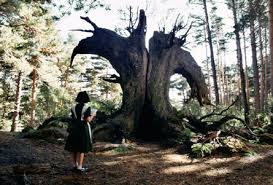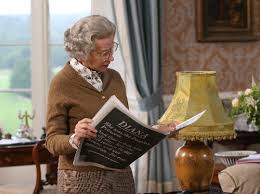In 2006, as in many years, the screenplay categories became the place to recognize films that the Academy voters couldn't cram into the Best Picture category, either because they were too weird, too "genre," or too divisive to include. On a whole, I would say that the adapted screenplays were stronger than the originals this year, especially since some of the originals felt more like adapteds. But without further ado, here are the nominated scripts.
Winners marked with (*).
BEST ADAPTED SCREENPLAY










Winners marked with (*).
BEST ADAPTED SCREENPLAY
Borat: Cultural Learnings of America for Make Benefit Glorious Nation of Kazakhstan; screenplay by Sacha Baron Cohen & Anthony Hines & Peter Baynham & Dan Mazer, story by Sacha Baron Cohen & Peter Baynham & Anthony Hines & Todd Phillips
Based on a character from star Sacha Baron Cohen's cult HBO sketch series Da Ali G Show, it's kind of amazing that Borat was nominated for its screenplay, of all things. It's not that the movie was bad: it's actually a scathing critique of xenophobia, both American and global, and it's riotously funny in many parts. However, the "screenplay" is some incidental material placed between unscripted, candid segments in which real people are interviewed/ambushed by Borat. It's kind of hard to judge how much of the film was really following a script, but the parts that are scripted are rather funny and do give the film a sense of narrative. Still, I don't know that it's necessarily an Oscar-worthy work; if you're looking for something worthy here, it's Cohen's performance.
Children of Men; screenplay by Alfonso Cuaron & Timothy J. Sexton and David Arata and Mark Fergus & Hawk Ostby
Children of Men, based on P.D. James' novel of the same name, is easy to consider a "director's film," since so much of it's impact comes from its unique and powerful visuals. But one shouldn't count out the screenplay, which forms the foundation on which those images are built. The writing team for the film created a strong, tight script, focusing on the story and avoiding the easy pratfalls of expository characters or blank "audience windows," two types of characters that often plague sci-fi thrillers. The world is established visually, which allows the script to build the emotional impact of the story, resulting in a truly provocative thriller. It's a deft piece of work, and certainly one of the year's best.
The Departed; screenplay by William Monahan*
Speaking of taut thrillers, how about this twisty, pulse-raising Best Picture winner? Based on the Hong Kong thriller Infernal Affairs, this remake takes the tale of criminal informants and crooked cops to the mean streets of Boston. and Monahan does a terrific job of both balancing the constantly-shifting allegiances and double-crosses without losing the audience, as well as peppering the dialogue with plenty of local flavor (his dialogue for Mark Wahlberg's Lt. Dignam, in particular, is excellent). However, he doesn't write women well, and the film loses it's way a bit when it turns to the love triangle. Still, it's a commendable work, and proof that the sophisticated cat-and-mouse thriller hasn't died out.
Little Children; screenplay by Todd Field & Tom Perrotta
Adapting his own novel with director Field, Perotta faced the difficult task of making a suburban drama that was original enough to stand out from a crowd of such films. And the two succeeded triumphantly in scripting this wonderful film, examining the ennui that develops between several different characters against the backdrop of a convicted pedophile moving into the neighborhood. Not only does the film capture the attempts to break the monotony through passionate, adultrous sex, but it also manages to humanize aforementioned pedophile Ronnie into a man that maybe you don't want to sympathize with, but ultimately do anyways. It's an astounding piece of work, and Field & Perrotta earned their nominations here.
Notes on a Scandal; screenplay by Patrick Marber
Playwright Marber certainly did more than a good job in adapting Zoe Heller's novel, tackling the film's bizarre central relationship and making it feel completely enthralling. Of course, it helps that Judi Dench was sinking her teeth into the meaty lead of Barbara Covett, the teacher who becomes obsessed with Cate Blanchett's new teacher and the latter's steamy affair with a student. But Marber wisely keeps everything tense, layering his dialogue with subtext that delved into the notion of Barbara's closet homosexuality. It's a gripping work, and Marber (who also wrote the play and screenplay for Closer, an underrated gem) does a fantastic job with his script.
My ballot for Adapted Screenplay:
1. Children of Men; screenplay by Alfonso Cuaron & Timothy J. Sexton and David Arata and Mark Fergus & Hawk Ostby
2. The Departed; screenplay by William Monahan
3. Little Children; screenplay by Todd Field & Tom Perrotta
4. Notes on a Scandal; screenplay by Patrick Marber
5. Borat: Cultural Learnings of America for Make Benefit Glorious Nation of Kazakhstan; screenplay by Sacha Baron Cohen & Anthony Hines & Peter Baynham & Dan Mazer, story by Sacha Baron Cohen & Peter Baynham & Anthony Hines & Todd Phillips
BEST ORIGINAL SCREENPLAY
Babel; written by Guillermo Arriaga
As I've mentioned before in several posts related to this film, I'm a bigger defender of Babel than the general consensus is. It may just be Crash on a global scale, or another case of ensemble miserablism courtesy of director Alejandro Gonzalez-Inarritu, but I believe that Arriaga packed more into this film than just that. He's written a film that tackles our inability to communicate with one another, not only in languages foreign to us but in our native tongues as well. It's a thought-provoking work, and Arriaga juggles the various stories well. Sure, some parts are stronger than others (the segments surrounding Rinko Kikuchi's Chieko are the best), but as a whole Arriaga crafted a fine film here. It's certainly worthy work.
Letters from Iwo Jima; screenplay by Iris Yamashita, story by Paul Haggis and Iris Yamashita
This is the first of two films in this category that feel like they should be based on a novel or play, but are, in fact, original works. Haggis, who reached a peak prominence during the mid-'00s, worked on the story, but the real triumph in this story is Yamashita's script, which presents the Japanese side of the Battle of Iwo Jima. Yamashita crafts a quietly touching war story, no easy feat given the seemingly paradoxical nature of that description. The fact that it's in a foreign language makes it all the more commendable. This is powerful work, and it earned it's nomination.
Little Miss Sunshine; written by Michael Arndt*
The dysfunctional family comedy is a staple, particularly of independent cinema. Arndt faced a mighty challenge in making this film stand out from that pack, and he did it by building believable characters rather than running through a list of contrivances. It helps, of course, that the film had such a talented cast, but Arndt's script dives deep into what it means to be a family, as well as to experience personal growth with the help of others. Compared to other scripts in the category, it's not the best work of the year, but Arndt's screenplay is a fine entry.
Pan's Labyrinth; written by Guillermo del Toro
I have a lot of love for this film. This is the film that I first fell in love with del Toro's wonderful images and storytelling, and remains so far his best film. The strength of the film, set in the Spanish Civil War, is that it plays like a violent, dark fairy tale, the sort of story that a demented child, or del Toro, would come up with. The film also captures the magic of childhood, a time when wonder and fantasy do exist and provide an escape from harsh reality. Del Toro layers all of this into his brilliant and imaginative screenplay, and the result is a marvelous film.
The Queen; written by Peter Morgan
The Queen, like Letters from Iwo Jima, feels as if it should have been based on something, and unfortunately that's part of the problem with this script. Don't get me wrong, Morgan is a fine writer, and he has a flair for writing political films. However, The Queen's script often feels like a television movie, with character moments that are clunky or way too obvious. Morgan fares better with balancing the royal family with the Prime Minister's office, and the competing views on how the Queen should publicly handle the death of Princess Diana. But ultimately, the film's strengths come from its performances (especially Helen Mirren's) and, to a lesser extent, director Stephen Frears, not from Morgan's only-decent script.
My ballot for Original Screenplay:
1. Pan's Labyrinth; written by Guillermo del Toro
2. Letters from Iwo Jima; screenplay by Iris Yamashita, story by Paul Haggis and Iris Yamashita
3. Babel; written by Guillermo Arriaga
4. Little Miss Sunshine; written by Michael Arndt
5. The Queen; written by Peter Morgan
Comments